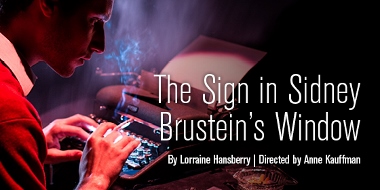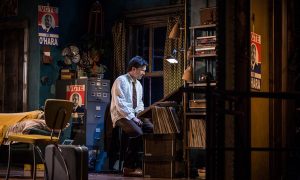LORRAINE HANSBERRY’S OTHER PLAY
Written five years after Raisin in the Sun and just before her early death at 34, Lorraine Hansberry’s last work is a challenging—as in problematic—play. The Sign in Sidney Brustein’s Window (deservedly or not, forever in the shadow of its predecessor) is a 1964 depiction of bohemian Gothamites caught in the throes of politics, art, and love. Inevitably, this three-act group portrait lacks the drive, coherence and emotional depth of Hansberry’s mistresspiece set on the South Side of Chicago. (It’s a bit like Rent without the music.) But its grasp of and compassion for eight lost dreamers, drifting in feckless searches for identity, is vintage Hansberry. Maybe she had only one great play in her: This lesser offering seems a bittersweet promissory note that was never to be redeemed. Happily, Goodman Theatre’s Chicago premiere, subtly shaped by Anne Kauffman, gives a discursive and unfocused drama all the urgency it can muster.
Humans want certainty as much as change. Hansberry’s seekers hurt hard—and they don’t hesitate to orate accordingly. (In a play more about solo despair than character conflict, the writerly dialogue, full of antiquated mid-60s Greenwich Village in-jokes, ranges from glib to glorious.) A failed nightclub owner who’s equally unqualified to run a radical journal, Sidney Brustein (Chris Stack, alternately irritating or forlorn) has turned his apartment into an activist/artistic hangout. Here bruised souls come to validate their values. Dismissive as he lurches between commitment and isolation, Sidney offers only conditional encouragement. At times resembling a drama queen mired in self-pity and delusions of beatnik purity, Sidney is a work in progress (or just a guy in flux).
An inept actress drained of esteem, self or otherwise, his wife Iris (Diane Davis, a butterfly with one wing) is reduced to doing T.V. commercials and mocking Sidney’s shifting and unreliable passions. Iris’s elder sister Mavis (Miriam Silverman, practical in her pathos) has settled for a compromising marriage and the joy of judging others. Her younger sister Gloria (haunting Kristen Magee), a goodtime girl now tasting hard times, is a supposed international model. Pill-popping Gloria is in sketchy love with Alton (Travis A Knight, an angry young man going off mission). An African-American bookstore clerk intent on being nobody’s “commodity,” this political crusader is as hard on others as he’s not on himself. (His comparison of prostitution to the slave trade would be preposterous if it weren’t serious.)
Continuing Hansberry’s odd octet, Max (Phillip Edward Van Lear, wasted in a pointless cameo) briefly appears an abstract painter (but never “arty”) whose thoughts are even more obscure. More developed, David is a taciturn, avant-garde gay playwright: Grant James Varjas gives this sad-sack closet case a dreary deadpan, amusingly so, since his sudden fame, as the author of a no-doubt ridiculous play about two men in a refrigerator, feels as absurdist as his play. Hardly fitting this Lower East Side milieu and existing only to incite disillusionment, Wally O’Hara (Guy Van Swearingen) is a reform politician intent on waging war against drugs: His fateful candidacy, which gives the play its far from dynamic title, finally gives Sidney a kind of cause.
Having introduced characters who talk themselves into existence and at times seem more like positions than people, Lansberry appears unsure what to do with them. The falling action in the second act feels as desperate as her overly eloquent hipsters. At play’s end, after much gratuitous suffering (as if to finally make the play about something), Sidney experiences an epiphany/apotheosis that may or may not last: “We shall make something strong out of our sorrow,” he declares to a chastened Iris. It’s like, at the unsought end of her short career, Hansberry had suddenly channeled Chekhov. But, despite literally glowing acting, the valediction feels a tad unearned and a bit perfunctory.
All this agit-prop activism and crushed idealism happens on Kevin Depinet’s appropriately messy cut-away set, with threatening fire escapes on one side and expressionistic rooftop scaffolding crushing the walk-up from above. It’s a formative dump where hope either goes to die or to find a firmer footing. Too true for wishful thinking or easy angst, Hansberry leaves the sequel to the audience. If only she’d had one herself.
photos by Liz Lauren
The Sign in Sidney Brustein’s Window
Goodman Theatre
Albert Theatre, 170 North Dearborn
ends on June 5, 2016
for tickets, call 312.443.3800 or visit Goodman Theatre
for more theater info, visit Theatre in Chicago












{ 1 comment… read it below or add one }
Excellent review. Thank you.